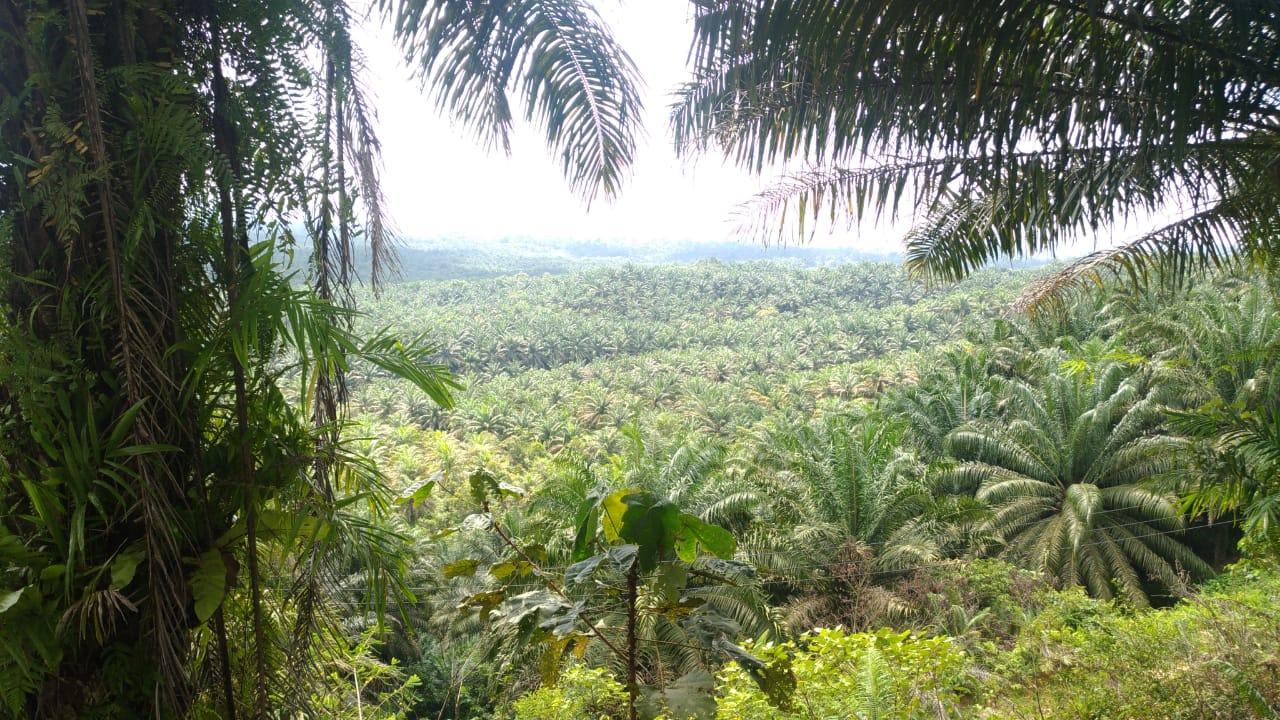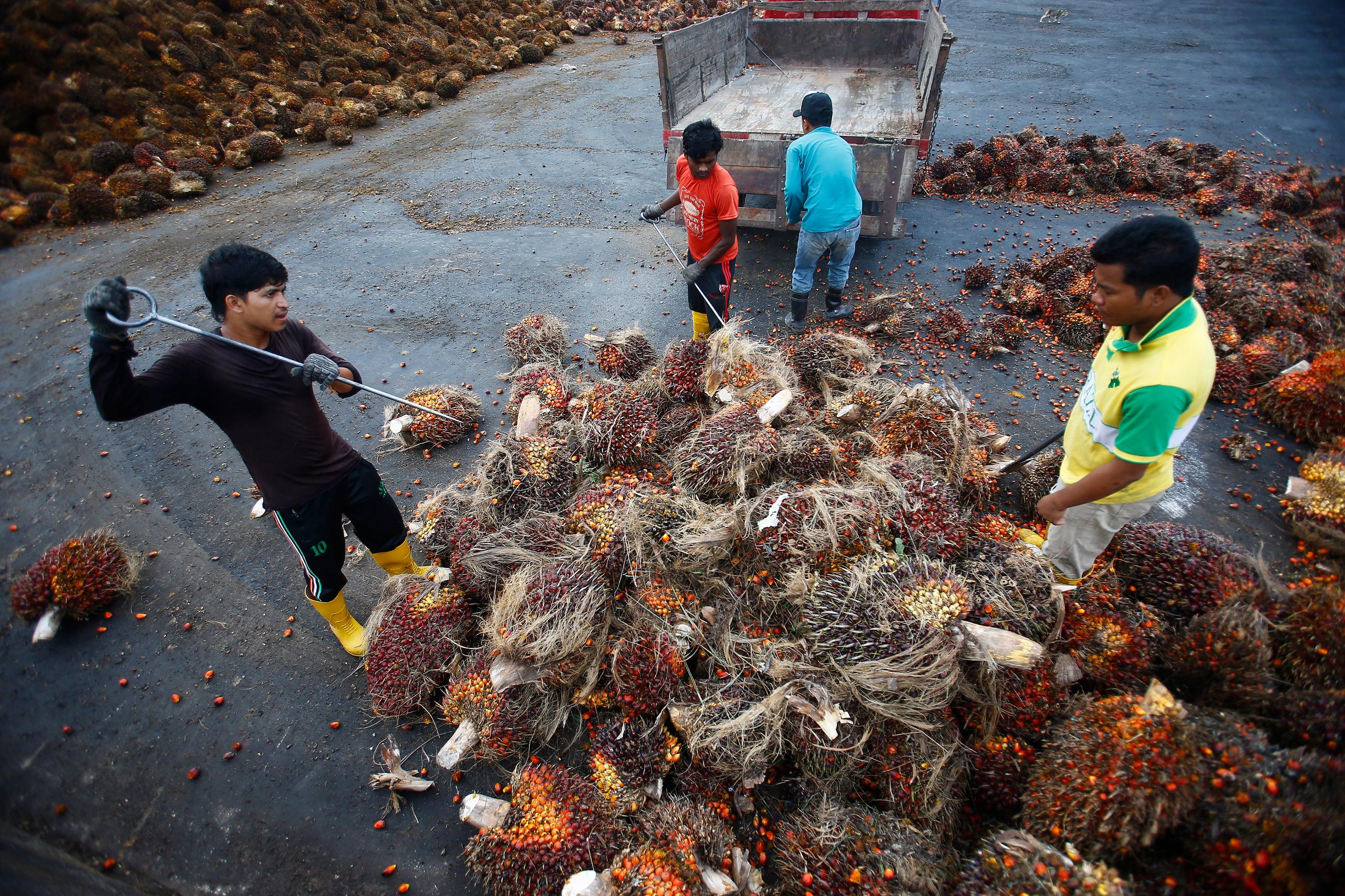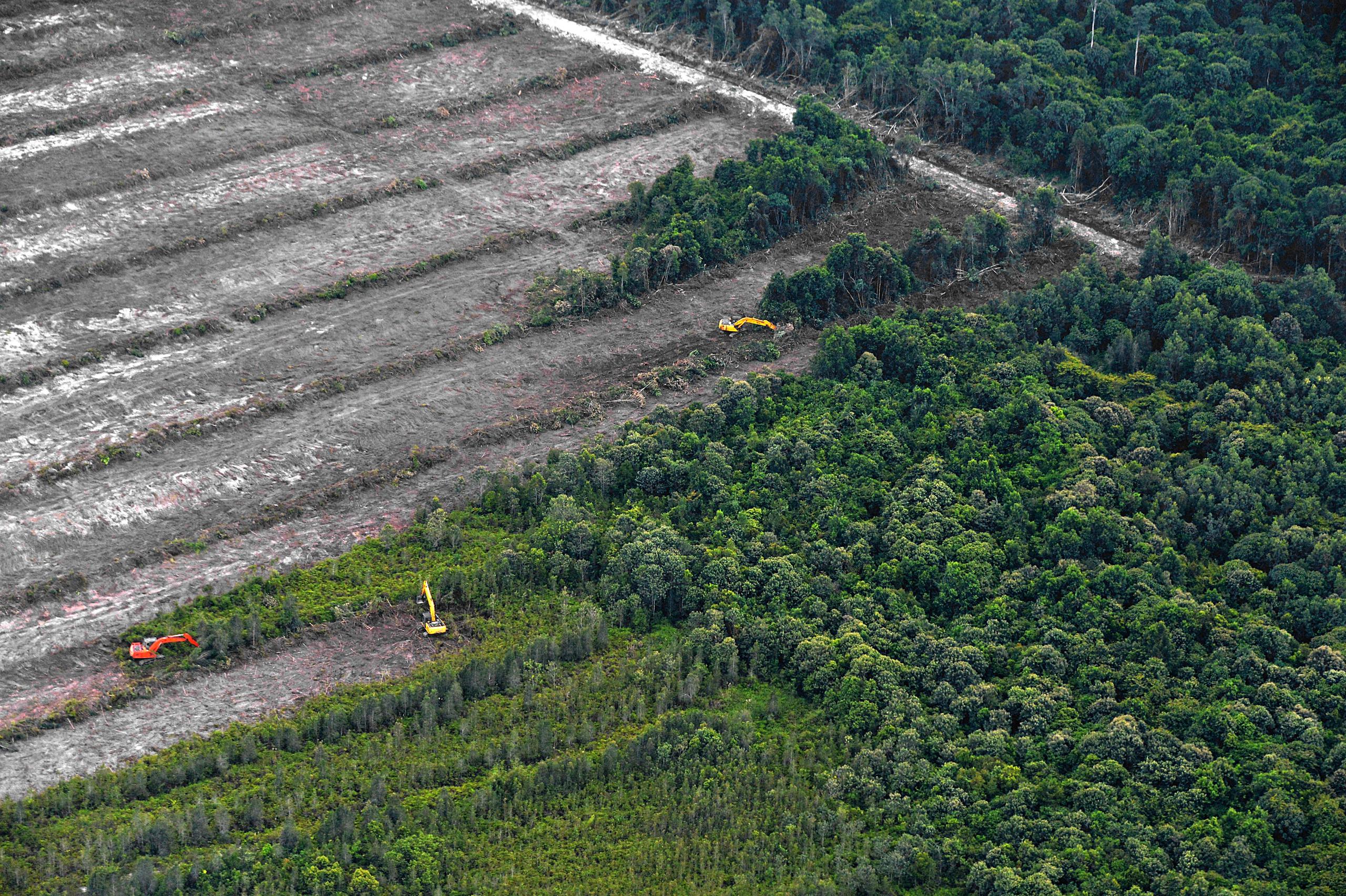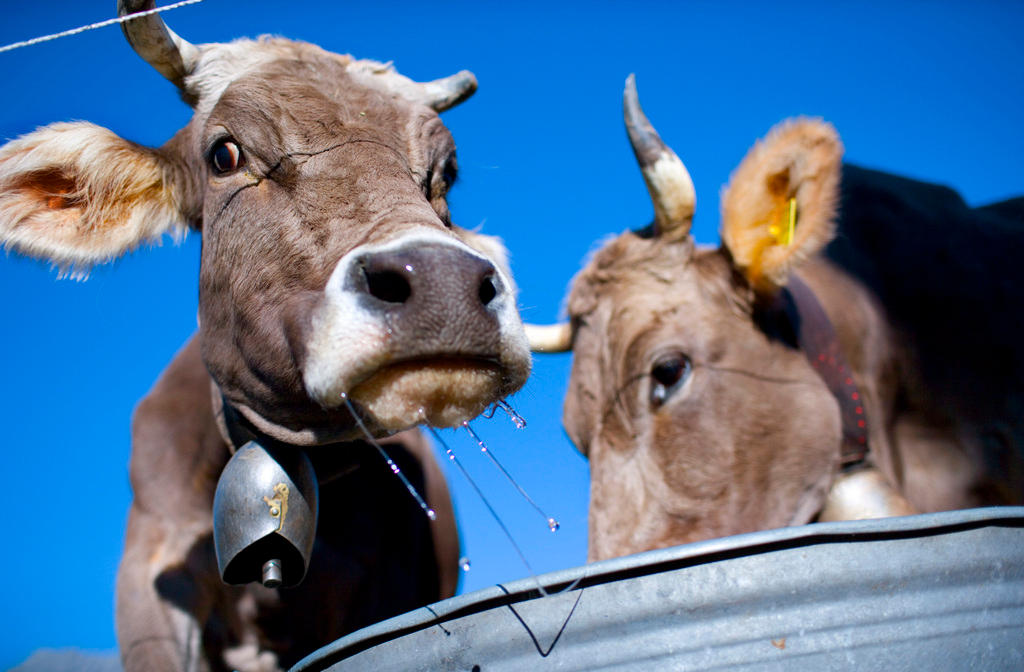Is the sustainable palm oil label on a slippery slope?

A recent spat between Swiss food giant Nestlé and the Roundtable on Sustainable Palm Oil (RSPO) highlights a growing rift over certification.
There is no such thing as bad publicity. Unless you are a multinational firm whose most recognisable product has been transformed into an object of revulsion via social media. This is what happened to Nestlé in 2010 when it was accused by Greenpeace of abetting deforestation in tropical countries by using unsustainable palm oil in its products. To drive the message home, Greenpeace created a gory YouTube videoExternal link in the style of a Kit Kat advertisement that equated eating the chocolate bar with killing orangutan apes.
Nestlé still uses a lot of palm oil. According to the annual report it submitted to RSPO, the company sourced close to 460,000 tonnes in 2017. This is more than 15 times the amount imported by Switzerland where the company is based. However, around 20% of Nestlé’s palm oil has been certified as sustainable by the RSPO: a coalition of palm oil producers, processors or traders, consumer goods manufacturers, retailers, banks and NGOs, that aim “to develop and implement global standards for sustainable palm oil”. As an RSPO member, Nestlé is expected to eventually obtain all of its palm oil from RSPO certified sustainable sources.
But this is not the direction the company wants to go even though it has committed to using 100% responsibly sourced palm oil by 2020.
Diverging strategies
Nestlé crossed swords with RSPO which suspended the food giant’s membershipExternal link in June for failing to include a time-bound plan towards 100% sustainable palm oil in its 2017 annual report. The spat was about two different approaches to procuring sustainable palm oil. RSPO’s premium certification system involves segregation: keeping sustainable palm oil separate from conventional oil all the way from plantation to the final product. However, it also offers a less premium “mass balance” option where the oils are mixed but resold in the correct proportions.
Nestlé argued that the RSPO system is insufficient and “is not conducive to achieving the levels of industry transparency and transformation the sector so urgently needs”. The Swiss firm has more faith in bringing more transparency in its own supply chain instead of relying on palm oil with RSPO’s stamp of approval. Nestlé claims that its in-house Responsible SourcingExternal link strategy has enabled it to trace 50% of the palm oil it buys back to the plantations and 92% back to the mills. The company also claims that its standards go “beyond the current requirements of the RSPO Principles & Criteria”. In other words, Nestlé thinks it can do a better job sourcing sustainable palm oil on its own and doesn’t want to commit to achieving 100% RSPO certified sustainable palm oil as required by RSPO.
Could this divergence be the reason that RSPO came down so heavily on Nestlé? A Nestlé spokesperson told swissinfo.ch that when the company stated that their goal is not to achieve 100% certification of palm oil, it was asked by RSPO to remove the 2017 action plan and re-submit that they have no action plan instead. This in turn is what got Nestlé suspended. In other words, RSPO was willing to suspend Nestlé rather than accept an official challenge to its unwavering approach on certification. What is clear is that RSPO does not want companies to go it on their own with their own standards for sustainability.
“There is broad acceptance that globally agreed standards must be implemented to stimulate the growth and demand for sustainable palm oil, in order to achieve market transformation and make sustainable palm oil the norm,” an RSPO spokesperson told swissinfo.ch.
In spite of the RSPO position, companies are beginning to look beyond the RSPO for sustainable palm oil requirements. The Anglo-Dutch multinational Unilever, which sources almost three times as much palm oil as Nestlé, has been looking at other options too.
“Certification is one of the ways to help to transform how palm oil is produced and traded and the role of the RSPO has played a key role in this. However, we know that certification alone does not guarantee solutions to all the social and environmental issues facing the sector,” the company states on its websiteExternal link.
Like Nestlé, Unilever is also trying to ensure more traceability on its own of the palm oil it sources from various suppliers. It claims they can currently trace 78% of their palm oil back to the mill and have even invested €130 million in their own palm oil refinery in North Sumatra to better control their supply chain.
No silver bullet
What prompted Nestlé and Unilever to look beyond RSPO for sustainable palm oil? RSPO’s Palm Trace systemExternal link only guarantees the green credentials of the oil but not the companies involved in delivering it to consumers. This means that a mill in Indonesia could supply oil from both sustainable plantations and those that have involved deforestation and land grabbing.
This is what happened with the Dayak Hibun indigenous community that live in the hamlets of Kerunang and Entapang in the Sanggau District in West Kalimantan, Borneo, Indonesia. The indigenous community is unhappy about almost 1,500 hectares of land, over which they claim communal rights, being allegedly appropriated for palm oil plantations without their free, prior and informed consent in 1996.
The company the Dayak Hibun are fighting is PT Mitra Austral Sejahtera (PT MAS), a subsidiary of Malaysian firm Sime Darby that claims to be the world’s largest producer of sustainable palm oilExternal link – and is an RSPO member despite the community’s complaints.
Since 2006, the Dayak Hibun have been campaigning against PT MAS and parent company Sime Darby with a list of 14 demands concerning their land rights. The 25-year lease on the land comes to an end in 2022 raising questions whether the indigenous community will finally be given a say on what happens in the future.
A lack of resolution led to an official complaint against Sime Darby to RSPO in 2012. But even the RSPO could not force Sime Darby’s hand. Frustrated by what it saw as a reluctance to punish Sime Darby, the Dayak Hibun decided to take the RSPO itself to task by filing a request for intervention by the Swiss National Contact PointExternal link of the OECD (Organisation for Economic Co-operation and Development) in January.
“The community is of the opinion that the RSPO has failed to comply with the RSPO’s own rules and procedures, and that as a result of these failures, the RSPO has failed to protect the community’s rights and it has failed to comply with the OECD Guidelines on Multinational Enterprises,” said a statementExternal link by the NGO TuK that represents the Dayak Hibun.
The community is particularly unhappy about the lack of transparency on RSPO’s part. RSPO claims it has yet to reach a conclusion regarding the complaint made in 2012 but is committed to finding a “constructive resolution”.
Adding another twist to the tale of the Dayak Hibun’s struggle for land rights is the involvement of Nestlé. PT MAS is among the 49 Sime Darby-owned mills listed by NestléExternal link in February as suppliers of the palm oil used in its products. Nestlé told swissinfo.ch that it is aware that PT MAS and parent company Sime Darby are involved in a dispute with the indigenous community and said they are monitoring the case closely.
Dysfunctional system?
The whole episode of the Dayak Hibun highlights weaknesses within the RSPO system. In an ideal world, Sime Darby would be suspended by RSPO until its subsidiary PT MAS resolved the conflict with the indigenous community and Nestlé would stop sourcing palm oil from PT MAS. Instead, RSPO suspends Nestlé for violating procedure (not submitting certain documents) while Sime Darby retains RSPO membership even though it violated key RSPO guidelines on land rights. In addition, Sime Darby continues to supply palm oil to Nestlé.
It is this kind of dysfunction that has led even environment pressure groups like Greenpeace to express their distrust of the RSPO approach and urge big companies to clean up their act on their own steam.
“Palm oil traders (typically corporations that also have plantation interests) continue to allow oil from rainforest destroyers into their mills, refineries and distribution systems, and neither governments nor the main industry body – the Roundtable on Sustainable Palm Oil (RSPO) – can currently be relied on to prevent producers from engaging in deforestation or clearing peatland. Accordingly, brands must adopt NDPE [no deforestation, no peat, no exploitation] policies if they have not already done so, and take responsibility themselves for ensuring that the producer groups in their palm oil supply chains comply with those policies as soon as possible, and no later than 2020,” says Greenpeace on its websiteExternal link.
Meanwhile, RSPO announced on July 16 that it had reached a compromise with Nestlé and reinstated its membership, despite the latter’s criticism of the certification approach.
“The RSPO is more than a certification scheme, it is a commitment scheme,” said RSPO CEO Darrel Webber in a statement announcing the reinstatementExternal link.
With the growing discontentment with the RSPO, it remains to be seen if this commitment will be put to the test again.

In compliance with the JTI standards
More: SWI swissinfo.ch certified by the Journalism Trust Initiative




You can find an overview of ongoing debates with our journalists here. Please join us!
If you want to start a conversation about a topic raised in this article or want to report factual errors, email us at english@swissinfo.ch.